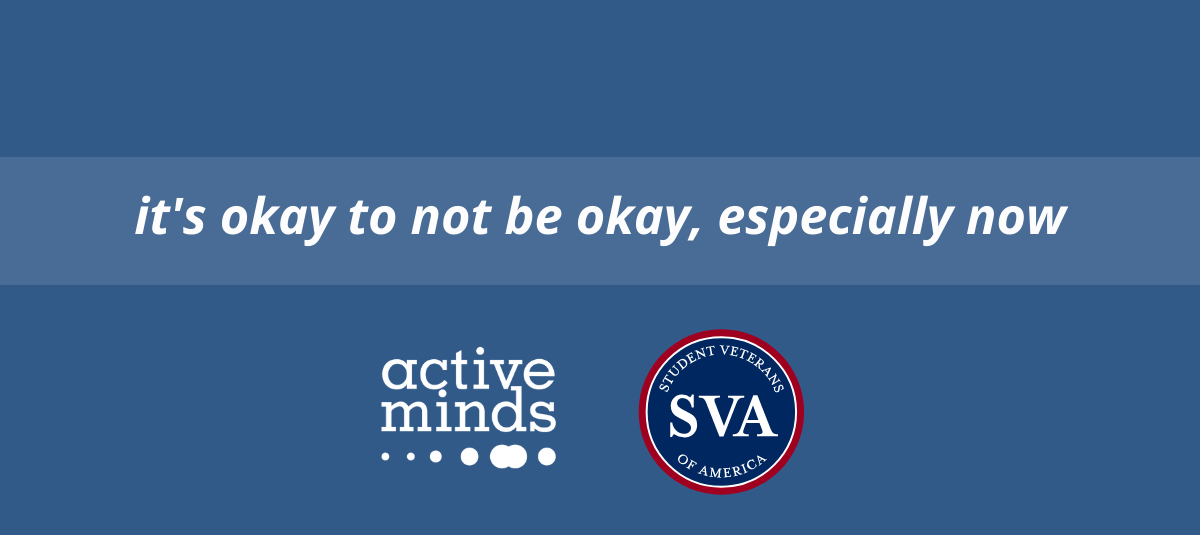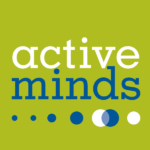There’s no doubt that seeing the recent events in Afghanistan continuously on the news and social media can be emotional. Many of us have experienced reactions to the news, from feelings of grief, to sadness, to uncertainty, or even anger. We hope that you know that no matter what you’re feeling, it’s okay. It’s okay to not be okay, especially now. While we’re all processing these images and feeling these emotions, one group may be particularly affected by what’s going on: Veterans. Whether you know a Veteran, live with a Veteran, or are a Veteran yourself, the most important thing you can do is be there for those around you, and prioritize your mental health.
While on Active Duty, the ability to destress and advocate for oneself is often unavailable due to the culture of the military. Therefore, having a healthy outlet for these complicated feelings, and being there for military-affiliated people in your life, can be difficult. To help, Active Minds and Student Veterans of America have put together some ways to support Veterans, their families, and yourself as we all process the events taking place in Afghanistan.
- Learn how to have open and honest conversations. For many, it may feel uncomfortable, or even unnatural, to share how you are feeling. This is especially true if you feel “wrong” for even having these emotions in the first place. We want to remind you that emotions are a normal and healthy part of you. Learning how to share how you are feeling, and how to be an active listener when others share, can help these emotions be processed more easily. Active Minds provides a resource for having difficult conversations, called V-A-R Training, that helps by demonstrating how you can be an engaged listener and offer help to those around you.
- Give yourself permission to set boundaries. It’s no secret that news consumption can be overwhelming. At one point or another, we’ve all experienced wanting to turn off our TV to avoid the negative events happening around us. And while it is good to be informed, there comes a time where you need to prioritize your mental health over the twenty-four hour news cycle. If you find yourself, or someone you know, scrolling endlessly through news updates, or unable to escape feelings of stress and anxiety around current events, remind them (or yourself!) that it’s okay to take a break. Go for a walk outside, talk to a loved one, or read something you enjoy; the news will still be there when you return.
- Encourage daily self-care. While self-care is a wonderful tool, and something we should all aim to make part of our daily routine, it doesn’t come naturally to everyone. This may be especially true for Veterans who may have not had the opportunity to learn about and practice self-care in the past. When you can, make an effort to encourage self-care to those around you: ask them to join you for a meal, offer to lend them your favorite book or movie, or urge them to take daily time for themselves. For some, a voice of encouragement may be all they need to take the step to prioritize their mental health.
Processing emotions is never linear, nor is it an isolated event. It happens daily. You may feel fine today, and unable to formulate your thoughts tomorrow. We hope we leave you with the message that this is normal, and you are not alone. Both Active Minds and the Student Veterans of America are here to support you, as are your family, friends, coworkers, and neighbors. Additionally, please feel free to utilize the resources provided below, or share them with the people in your life. While it may be hard to envision these feelings ever passing, just know that you will get through this, and you have a community rooting for you.
Resources
- Veterans Crisis Line – Connect with the Veterans Crisis Line to reach caring, qualified responders with the Department of Veterans Affairs. Many of them are Veterans themselves. Text 838255 for a free, anonymous, confidential resource that’s available to anyone, even if you’re not registered with VA or enrolled in VA health care.
- The Mental Health Resource Office on Your Campus – The mental health resource office on your campus may be a helpful resource to connect with counseling, psychological support, wellness resources, and more.
- Access Mental Health Services for Transitioning Service Members
- Blue Star Families – Find Your People, Build Your Community – Founded by military spouses, Blue Star Families empowers military families to thrive by connecting them with their civilian neighbors – both people and organizations – to create strong communities of support.
- VA Caregiver Support Line – VA’s National Caregiver Support Line provides support for caregivers, family members, friends, Veterans, and community partners. Their team is equipped to provide information on caregiver support services, counseling, educational services, and referrals (electronic notification) to local Caregiver Support Program (CSP) staff at VA medical centers (VAMC).
- National Suicide Prevention Lifeline – 1-800-273-TALK (8255)
- Find your nearest VA Health Facility/Vet Center – Help is available at any VA medical or Vet center.




